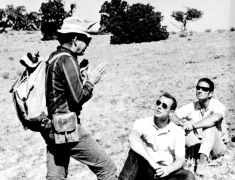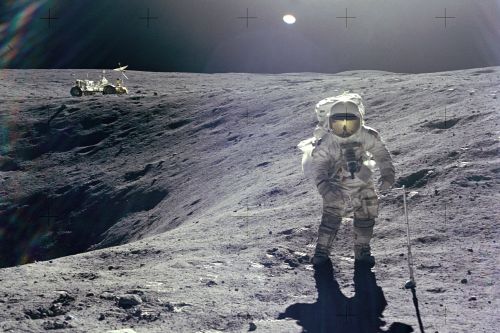Lee Silver
 Friday, March 20, 2009 at 1:26 PM • Manned Spaceflight
Friday, March 20, 2009 at 1:26 PM • Manned Spaceflight
 Friday, March 20, 2009 at 1:26 PM • Manned Spaceflight
Friday, March 20, 2009 at 1:26 PM • Manned Spaceflight
After watching From the Earth to the Moon (see previous entry), I decided to do some digging into Lee Silver, the Caltech geologist who spent several years teaching geology to the Apollo crews. Played by David Clennon in the series, he appears in two episodes: Galileo Was Right and Le voyage dans la lune.
 Now in his mid-eighties, Leon T. Silver retired from Caltech in 1996, where he remains W. M. Keck Foundation Professor for Resource Geology, Emeritus. This older page summarizes his research. He remains quite well known for his work on the Apollo program; when the HBO series came out, Silver talked about the differences between the series and real life (see also here). This contemporary article (1.5 MB PDF), which I presume is from a Caltech publication, profiles his work with the Apollo 15 crew, though in fact his work with the astronauts began with the Apollo 13 crew. Finally, Silver sat for a series of interviews about his life and career between 1994 and 2000; go to session 3 for his work on Apollo (he’s quite candid).
Now in his mid-eighties, Leon T. Silver retired from Caltech in 1996, where he remains W. M. Keck Foundation Professor for Resource Geology, Emeritus. This older page summarizes his research. He remains quite well known for his work on the Apollo program; when the HBO series came out, Silver talked about the differences between the series and real life (see also here). This contemporary article (1.5 MB PDF), which I presume is from a Caltech publication, profiles his work with the Apollo 15 crew, though in fact his work with the astronauts began with the Apollo 13 crew. Finally, Silver sat for a series of interviews about his life and career between 1994 and 2000; go to session 3 for his work on Apollo (he’s quite candid).
The passing of the moon walkers
 Friday, March 20, 2009 at 11:51 AM • Manned Spaceflight
Friday, March 20, 2009 at 11:51 AM • Manned Spaceflight
 Friday, March 20, 2009 at 11:51 AM • Manned Spaceflight
Friday, March 20, 2009 at 11:51 AM • Manned Spaceflight

Lunar module pilot Charles M. Duke Jr. collecting samples during the Apollo 16 mission on April 21, 1972. Duke, the youngest person to walk on the Moon, is now 73 years old. (Photo information)
Jennifer and I finished watching the 1998 HBO miniseries From the Earth to the Moon last night. If you’ve seen it, you know how good it is; if you haven’t, and you have any interest in human spaceflight, what the hell is wrong with you? Get it right now: Amazon.com, Amazon.ca.
Anyway, it’s triggered (or rather, reawakened) a fairly passionate interest in the history of NASA, so expect a few posts in this vein in the near future. (Consider yourself warned.) Including this one:
Of the 24 astronauts who have travelled to the moon,1 six have since died:
- Jack Swigert (Apollo 13) died in 1982 from bone cancer shortly after being elected to Congress; he was 51.
- Ronald Evans (Apollo 17) died of a heart attack in 1990 at the age of 56.
- James Irwin (Apollo 15) died in 1991 at the age of 61. He had developed arrhythmia during the mission, and died after a series of heart attacks. He was the eighth person to walk on the Moon.
- Stuart Roosa (Apollo 14) died in 1994 due to complications from pancreatitis; he was 61.
- Alan Shepard (Apollo 14) — the first American in space — died in 1998 from leukemia at the age of 74. He was the fifth person to walk on the Moon.
- Pete Conrad (Apollo 12) died in 1999 at the age of 69, after a road accident. He was the third person to walk on the Moon.
Remembering Challenger
1 Saturday, January 28, 2006 at 6:57 PM • Manned Spaceflight
Saturday, January 28, 2006 at 6:57 PM • Manned Spaceflight
 Saturday, January 28, 2006 at 6:57 PM • Manned Spaceflight
Saturday, January 28, 2006 at 6:57 PM • Manned Spaceflight
To pick up on Megnut’s and Damien’s memories of the 1986 Challenger explosion on its twentieth anniversary:
When it happened, I was in Grade 8, a space-crazy kid filled to the gills with Star Trek and histories of NASA, and the deaths of seven astronauts was more than just a shock. I found out at the noon hour — I’d come home to make myself lunch and had flipped on the television for background. I was stunned, riveted — but of course, I had to go back to school, where I could think of little else.
At that time the Winnipeg Free Press was published in the afternoon, and I had a paper route after school. It was late that day; in a rare move, the paper had stopped the presses and remade the front page, which now read, in the biggest type I would see until Gorbachev was ousted in a coup, “Shuttle explodes.” Later that night, as I was collecting my paper money from my customers, I couldn’t help myself from talking about it with them — or with anyone.
It might be that for my generation — those of us who were children then, in our late twenties or early thirties now — it was our Kennedy assassination, our Pearl Harbor, our 9/11: the event that brought us to a collective halt.
(I live-blogged Columbia’s destruction three years ago.)
Note: Entries prior to November 2003 did not have categories assigned to them, and are not included in category archives; please consult the monthly archives.